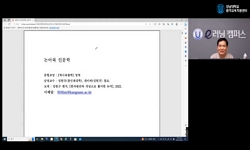본 논문에서는 孔子의 교육사상의 핵심인 《論語》속에서 교육사상에 관련 있는 항목들을 발췌하여, 상세한 원문과 함께 그 취지를 파악하여 孔子의 교육사상에 대하여 알아보았다. 孔子...
http://chineseinput.net/에서 pinyin(병음)방식으로 중국어를 변환할 수 있습니다.
변환된 중국어를 복사하여 사용하시면 됩니다.
- 中文 을 입력하시려면 zhongwen을 입력하시고 space를누르시면됩니다.
- 北京 을 입력하시려면 beijing을 입력하시고 space를 누르시면 됩니다.
https://www.riss.kr/link?id=T10533632
- 저자
-
발행사항
화성 : 水原大學校 敎育大學院, 2005
-
학위논문사항
학위논문(석사) -- 水原大學校 敎育大學院 , 中國語敎育專攻 , 2005. 8
-
발행연도
2005
-
작성언어
한국어
- 주제어
-
KDC
370.10912 판사항(4)
-
DDC
370.951 판사항(21)
-
발행국(도시)
경기도
-
형태사항
i, ii, 101p. ; 26cm
-
일반주기명
참고문헌: p. 96-99
- 소장기관
-
0
상세조회 -
0
다운로드
부가정보
국문 초록 (Abstract)
본 논문에서는 孔子의 교육사상의 핵심인 《論語》속에서 교육사상에 관련 있는 항목들을 발췌하여, 상세한 원문과 함께 그 취지를 파악하여 孔子의 교육사상에 대하여 알아보았다.
孔子의 敎育思想의 근본이념은 修己治人 할 수 있는 '仁'의 실천인 으로서 君子를 길러내는 것으로 사회를 바로잡을 治者의 배출이었다.
孔子의 敎育內容은 《詩》·《書》·《禮》·《易》·《樂》·《春秋》등 六藝이외에도 '四敎'로서 文·行·忠·信과 孝道를 교육의 내용으로 삼았다. '文'은 古來로 전해오는 聖賢의 가르침인 六藝를 의미하는 것이고, '行'은 孝悌의 행함을 뜻하므로 곧 德行을 말한다. '忠'은 사람의 진실 되고 忠誠된 마음을 뜻하는 것이고 '信'은 신의가 있는 믿음성이 있는 마음이다.'孝道'란 인간의 가장 기본적인 윤리·도덕규범으로써 은혜를 갚을 줄 알고, 공경할 줄 아는 마음을 항상 지켜야 한다는 것이다.
孔子의 敎育方法으로는 평등적 교육방법, 개성적 교육방법, 계발적 교육방법, 원칙적 교육방법으로 나누었다.
평등적 교육방법에서 孔子는' 가르침에는 차별이 있을 수 없다'라고 하여 인간을 교육함에 있어서 누구나 교육을 받을 수 있음 말해준다.
개성적 교육방법에서는 학생의 능력과 성격에 따른 차이를 충분히 고려하여 사람에 따라 가르침을 달리 하며, 資質에 따라 가르침을 준다.
계발적 교육방법은 내면적 사고를 중히 여겨 학습 동기를 유발하여 문제를 제기한 다음, 자발적으로 학습하게 하는 방법이다.
원칙적 교육방법에서 가장 큰 특색은 학생스스로에게 왜 이것을 배워야 하는지 동기유발을 가장 극대화시켜주는 것이다.
孔子의 교육 사상은 인성교육을 중시여기고, 학생들의 개인적인 재능과 소질계발에 역점을 기우리고, 나아가서는 훌륭한 학식 있는 사람이 되기 이전에 먼저 훌륭한 인격과 도덕적 소양을 갖추도록 교육을 실시하였다.
다국어 초록 (Multilingual Abstract)
The purpose of this study is to examine the objectives of the 《The Analects》 which is the essence of education philosophy of Confucius, based on the excerpts related to his education philosophy along with their extensive original text. The basic ...
The purpose of this study is to examine the objectives of the 《The Analects》 which is the essence of education philosophy of Confucius, based on the excerpts related to his education philosophy along with their extensive original text.
The basic principle of Confucius' education philosophy is to train a man of virtue(Gunja) who practices perfect virtue, In(仁), to 'run a country based on the self-discipline(修己治人)' and produce high officials who correct the wrongs of the society.
The contents of the Confucius' education include 6 classics, 《Poetry》·《History》·《Propriety》·《The Book of Changes》·《Music》·《Spring and Autumn Annals》 along with 'Writings, Conduct, Loyalty and Faith' as 'four disciplines' and 'Filial Piety.' 'Writings' refer to the 6 classics inherited by the ancient words of the wise, 'Conduct' means virtuous conduct including filial piety and brotherly love, 'Loyalty' means the sincere and credible mind of human, and 'Faith' means the reliable mind with fidelity. 'Filial Piety' as the most fundamental ethical and moral code of human being means that one should return the moral indebtedness and respect the others coherently.
The methods of Confucius' education are divided into egalitarian education, individual education, developmental education and fundamental education.
Regarding egalitarian education, Confucius mentioned that 'no discrimination should take place in education', so that anyone can be educated.
Regarding individual education, the difference of ability and personality of individual student is sufficiently considered, so that education should be differently applied to each student based on the individual inclination.
Developmental education values the internal thought to motivate students for learning, present the issues and let them learn spontaneously.
Regarding fundamental education, the most unique feature thereof is to value character education, focus on developing individual talents and aptitudes, and emphasize the priority to have desirable character and ethical grounding before one becomes a man of knowledge.
목차 (Table of Contents)
- 국문초록 = ⅰ
- 目次 = ⅰ
- Ⅰ. 序論 = 1
- 1. 硏究目的 = 1
- 2. 硏究方向 = 2
- 국문초록 = ⅰ
- 目次 = ⅰ
- Ⅰ. 序論 = 1
- 1. 硏究目的 = 1
- 2. 硏究方向 = 2
- 3. 孔子의 時代背景과 生涯 및 思想 = 4
- 1) 時代背景 = 4
- 2) 生涯 및 思想 = 10
- Ⅱ. 孔子思想의 根本理念 = 24
- 1. 孔子의 人間觀 = 24
- 1) 理想的 人間觀 = 24
- 2) 人間의 本性 = 27
- 3) 人間의 本能 = 32
- 2. 孔子의 仁者觀 = 36
- 1) 仁의 意味 = 37
- 2) 仁의 實踐性 = 46
- Ⅲ. 孔子의 敎育觀 = 51
- 1. 孔子의 敎育目標 = 51
- 1) 君子 배출 = 52
- 2) 정치인재 양성 = 55
- 2. 孔子의 敎育內容 = 56
- 1) 文敎 = 59
- 2) 行敎 = 67
- 3) 忠敎 = 69
- 4) 信敎 = 71
- 5) 孝道 = 73
- 3. 孔子의 敎育方法 = 78
- 1) 平等的 敎育方法 = 79
- 2) 個性的 敎育方法 = 82
- 3) 啓發的 敎育方法 = 85
- 4) 原則的 敎育方法 = 87
- Ⅳ. 結論 = 92
- 參考文獻 = 96
- Abstract = 100













